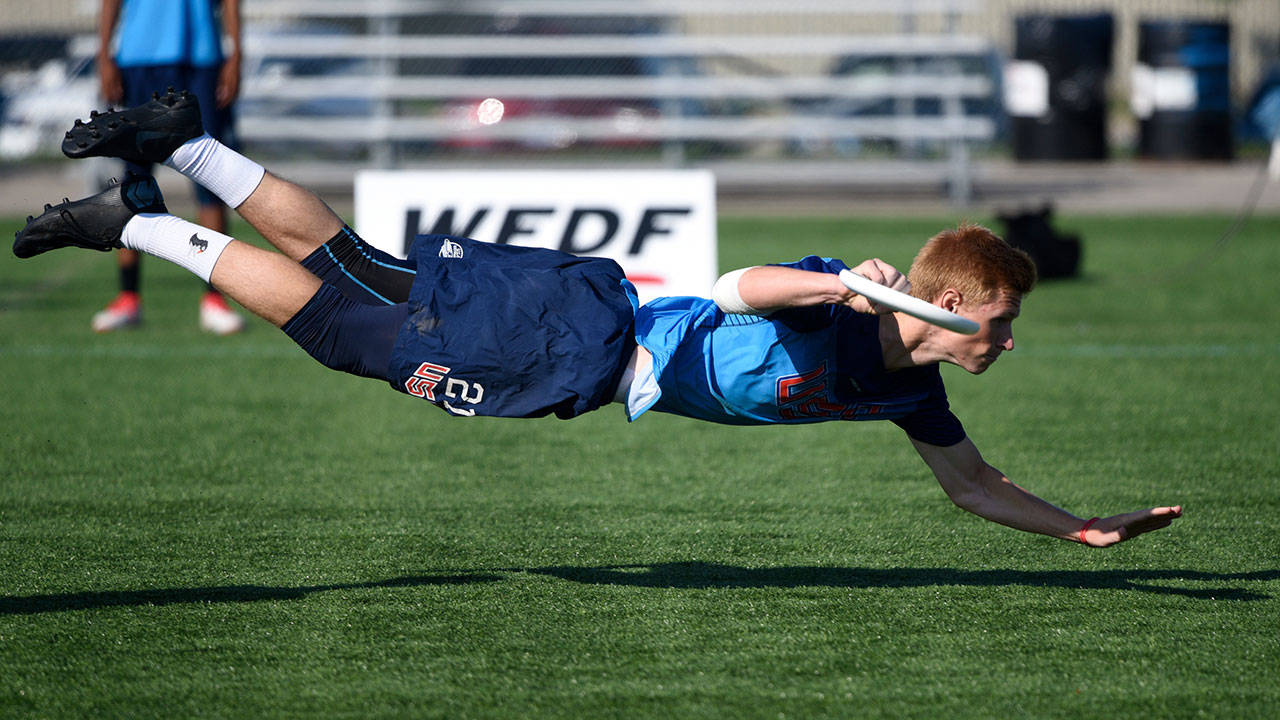It all started with a pick-up game.
Now Connor Ryan is the winner of a gold medal in the World Junior Ultimate Championships for ultimate Frisbee.
Ryan, who grew up in Bayview, first started playing ultimate Frisbee in fourth grade when he joined a pick-up game at the South Whidbey Sports Complex soccer fields. He heard about the group from the dad of one of his classmates at the Whidbey Island Waldorf School.
“I started playing pick-up here on Whidbey and that basically hasn’t changed…that’s just been with a group of Whidbey Frisbee players who vary in age and talent,” he said.
The classmate’s dad, Nat Scholz of Bayview, said the age and skill-level variation was helpful to Ryan’s playing. When Ryan was younger, Scholz would take him with his own kids to week-long ultimate camps in Seattle to learn the rules, strategies, and techniques of the game. “Most of the kids in Seattle play the same age [groups]. On the Island, they’re playing with older kids and adults so they get to basically match themselves up against people with more advanced skills,” Scholz said.
“Also they get to see people modeling good spirit.”
Spirit of the game, though important in all sports, is especially important in ultimate Frisbee. It’s one of the only sports that doesn’t include referees — the players make all the calls. At higher levels of play, like the WJUC games, there will be an “observer” who acts as a mediator between players but does not make any calls themselves.
Ultimate Frisbee is a no-contact sport. Two teams of seven try to move the Frisbee down a field that’s about as long as a football field to their respective end zones. A player who is holding onto the Frisbee is not allowed to run with it but can only pivot on one foot. If the player does not throw the Frisbee in 10 seconds, then the disc goes to the other team, but again since there aren’t referees — the players decide.
“It’s fundamental to the sport. It’s one of the few sports that doesn’t have referees the players resolve their own fouls, [and] contested plays,” Sholz said.
Both Ryan and Sholz attested to the fact that Seattle is a “hotbed” for ultimate Frisbee. Although the sport was mostly played at the collegiate or adult level, in the past couple of decades a lot of adults have gotten into coaching and encouraging youth to try it.
“Over time, it’s sparked a really vibrant youth scene in Seattle. And that’s continued to grow,” Sholz said.
On the WJUC national teams there were five men and eight women from the Seattle area. “And that’s after they try to draw from all over the U.S.,” Ryan said. He explained that there are two separate tryouts for the East and West coasts, and that to have so many people from the Seattle area is indicative of how strong the program is there. After competing through multiple rounds of tryouts with people from all over the country, Ryan earned a spot on the U.S. national team.
“He was a natural talent,” Sholz said.
“It was something that I kind of pursued on my own,” Ryan said. After graduating from the Whidbey Island Waldorf School he went to play for Seattle’s Roosevelt High School varsity ultimate Frisbee team for all four years. During the summer he would participate in ultimate competitions.
“Basically with those, that’s much more elite than just high school Frisbee. I knew a couple people that were also applying to go to [WJUC national team] tryouts and they told me that I should,” Ryan said. “It had been something that I’d wanted to do, and so I did, and I got the spot.”
He learned that he made the team while he was in class, at the same time as his friend on the women’s team. Once he made the team, he said they only had one week of practice together before the tournament.
“A lot of other teams in Europe get to practice together a lot before the tournament and even Canada goes to other Frisbee tournaments and gets team bonding and chemistry there. But in the U.S. we couldn’t afford to do that because it’s such a widespread group of people so it’d be really expensive to get us together like that,” he said.
The players met in Chicago to practice and boarded a bus to Waterloo, Ontario, Canada for the competition. “How quickly we bonded and how much fun we had playing together just took a lot of the pressure of what were doing off,” he said.
“[That] indicated the talent of our team kind of let us dominate and walk through most teams up until the semi-finals and finals.” There were 18 countries in the men’s tournament and 13 in the women’s tournament.
Ryan and the U.S. faced Canada in the finals, which was delayed twice because of thunderstorms. After the delay, the U.S. national team warmed up and collected themselves and came back ready to play to win. “We did that a lot better than Canada and we kind of blew them out of the water after that,” Ryan said. The U.S. beat Canada 15-10. Ryan scored six goals for his team, more than any other player.
Now Ryan is getting ready to take a gap year to travel Europe. His first stop is in Italy to take a month-long drawing class. As for what’s next — “I’m not actually sure where. I’m just going to buy a Euro rail pass and just head up into Europe.” He said he has the contact information for some of the players from the European teams and may play with them while he’s there.
He wanted prospective players to know that having the spirit of the game is important – respect for yourself and your opponent — and the athleticism required. “It’s not just quite throwing and catching.”



